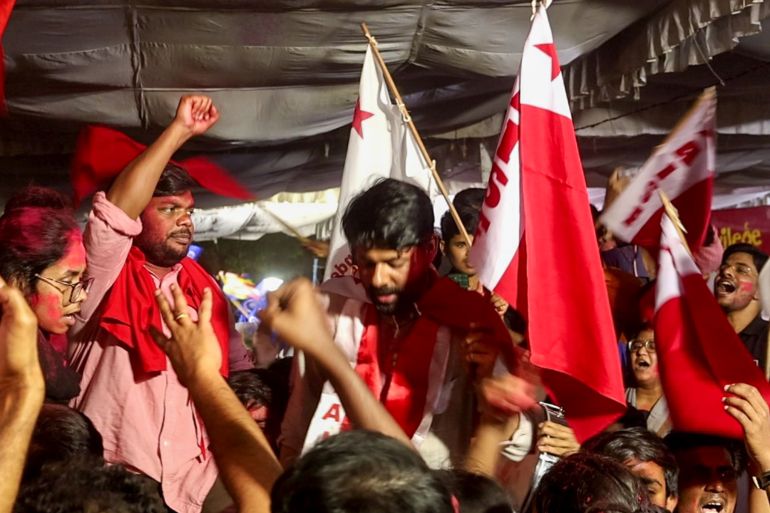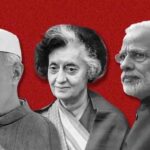This is New Delhi, India. The following week, a Bollywood movie titled JNU would be released in theaters all around India. The question “Can one educational university break the nation?” is posed as a catchphrase on the posters that are used for publicity.
This film is just the most recent example of a thinly veiled attack on Jawaharlal Nehru University (JNU), which is considered to be one of the most prestigious public universities in India. For decades, JNU has also been a hotbed of political activism. The university’s admissions requirements are designed to ensure that students from some of the most impoverished and neglected regions in the country have the opportunity to receive a quality higher education.
The university, which is a longstanding bastion of left-liberal politics and is named for India’s first prime minister under independent government, has been a prominent focus of political attacks from the Hindu majoritarian right in the country, particularly under the administration of Prime Minister Narendra Modi. Just like in the movie, detractors of the university who are affiliated with the Bharatiya Janata Party (BJP) of Prime Minister Narendra Modi have referred to JNU as a “anti-national” hub due to its political activities. Treason has resulted in the imprisonment of both current and former students. The administration of the university, which was chosen by the BJP government, has been accused by the faculty of lowering quality standards and the procedures for making appointments in order to fill the faculty with professors who are ideologically aligned with the government.
In the midst of a heated campaign for national elections that are expected to take place in April and May, the institution held its own voting for the JNU Students Union (JNUSU) last week. JNUSU has a long history of being one of the most powerful and important student groups in India. The results of the JNUSU polls, which were conducted for the first time in four years, were released on Sunday.
A victory for the BJP is anticipated on a national scale. It was unsuccessful at JNU.
The newly elected president of the students union, Dhananjay, made the following statement in his victory speech: “This election was a referendum against the right wing.” Although he is a student of theatre and performance studies at the School of Arts and Aesthetics at JNU, the student, who is 28 years old, is also the first Dalit to be chosen president of the JNU Student Union in nearly three decades.
JNU, which is situated on rocky hills that are covered in forest in the southern part of New Delhi, is frequently referred to as a bubble. There is little evidence to suggest that the results of the elections for the student body at JNU are any kind of reflection of the sentiment of the nation. With the victory of a coalition of left-wing organizations on Sunday, many individuals within the institution that is most well-known for its pedagogy and research in the social sciences were able to take a respite from what they considered to be efforts by the Bharatiya Janata Party (BJP) and its allies to obtain control of their refuge.
‘Solidarity and hope’
Over the course of several decades, the JNUSU has been dominated by organizations that are linked with India’s several communist parties. Nevertheless, the Akhil Bharatiya Vidyarthi Parishad (ABVP), a pan-India student organization connected with the far-right Rashtriya Swayamsevak Sangh (RSS), the ideological mentor of the Bharatiya Janata Party (BJP), came into being in the early 1990s as a result of the growth of Hindu nationalism.
Among the graduates of this university are Nobel Laureates such as Abhijit Banerjee, who was awarded the economics prize in 2019, as well as prominent figures from other countries, such as Ali Zeidan, the former Prime Minister of Libya, and Baburam Bhattarai, the former Prime Minister of Nepal. JNU was the educational institution of choice for a significant number of India’s most prominent political figures, including Sitaram Yechury, the leader of India’s most prominent communist party, as well as S. Jaishankar, the current foreign minister of the BJP administration, and Nirmala Sitharaman, the finance minister.
Over the course of several decades, the JNUSU has been dominated by organizations that are linked with India’s several communist parties. Nevertheless, the Akhil Bharatiya Vidyarthi Parishad (ABVP), a pan-India student organization connected with the far-right Rashtriya Swayamsevak Sangh (RSS), the ideological mentor of the Bharatiya Janata Party (BJP), came into being in the early 1990s as a result of the growth of Hindu nationalism.
Among the graduates of this university are Nobel Laureates such as Abhijit Banerjee, who was awarded the economics prize in 2019, as well as prominent figures from other countries, such as Ali Zeidan, the former Prime Minister of Libya, and Baburam Bhattarai, the former Prime Minister of Nepal. JNU was the educational institution of choice for a significant number of India’s most prominent political figures, including Sitaram Yechury, the leader of India’s most prominent communist party, as well as S. Jaishankar, the current foreign minister of the BJP administration, and Nirmala Sitharaman, the finance minister.
On the other hand, the next national elections have the potential to influence the future of JNU just as much, if not more, than the students who were elected over the weekend.
Since the year 2014, when Modi was elected as Prime Minister, his government has presented the university as a center of activities that are intended to break India.
Sedition and “terrorism” charges have been brought against students and former students, particularly Muslims like Umar Khalid and Sharjeel Imam, who have been arrested and charged during this incident. Many people are still incarcerated. The failure of the university administration to organize elections since 2019 was allegedly part of a pattern of acts that were intended to stifle political engagement on campus, according to the students who presented their allegations.
In spite of the fact that COVID-19 lockdowns prevented elections from taking place in 2020 and 2021, the JNU administration was reluctant to have elections in the years that followed “because it wanted elections to stop forever,” according to Aishe Ghosh, the outgoing president of the JNU Student Union.
It appeared as though it would be impossible to hold the election once more, but the students demonstrated their solidarity and hope, she said. At JNU, in contrast to other public colleges, the elections are run by students, who come together to create an Election Committee in order to monitor the entire voting process.
“Because the Election Committee was comprised of a large number of new members, the break in the process of conducting the election constituted a significant challenge. Nevertheless, I assured the management of the university that if I started the process once, I would see it through to the conclusion,” said Chief Election Commissioner Shailendra Kumar, who is currently pursuing a PhD degree in South Asian studies.
According to him, “We have done so successfully and sensitively,” and he also mentioned that a Braille system was created for the very first time in order to accommodate voters who are visually impaired.
‘Punching bag for BJP’s politics’
The vote for the JNU took place a few weeks before India is scheduled to hold elections in a marathon six-week exercise that will begin on April 19. However, it is highly probable that the institution will play a role in the campaign of the BJP, as evidenced by the fact that the film JNU was released on April 5th.
The film is one of a number of films that are quite similar to it that have been created by a group of Bollywood filmmakers with the intention of allegedly promoting Modi’s BJP. Clearly depicting a renowned university building with two opposing groups of students demonstrating in front of it, the advertising posters for the film are divided in half between tones of saffron and red.
It is not a new phenomenon for the Left to find victory in JNU. According to Harish S. Wankhede, a professor at the Centre for Political Studies at JNU, who answered questions from Al Jazeera, “It has been winning for many years and has been dominant ever since JNU came into existence a long time ago.”
“The remarkable thing is that the attempts made by the central government to modify JNU, both ideologically and demographically, did not have a significant impact on the campus. “The government’s efforts to smear JNU, to defame it, and to call it a den of anti-nationals did not bear any fruit to the right-wing student group,” the student group said.
Despite having been supported by a political atmosphere for four years, the ABVP did not win, according to Wankhede, who stated that it was shocking.
“JNU was considered a punching bag for the BJP’s politics,” Amisha Thakur, a doctorate student, said of the university in an interview with Al Jazeera. In agreement, Wankhede stated, “That is true because no other university was giving an intellectual opposition to BJP with as much fervour as JNU was doing.”
However, Govind Dangi, a student who is 29 years old and a candidate for the ABVP in the election, characterized the Left as a force that is on the verge of extinction at JNU.
In the moments before it goes out, the flame of a candle flickers. That candle that is being extinguished is the Left, he said.
During an election discussion that took place the day before the vote, Umesh Chandra Ajmeera, the presidential candidate for the ABVP, performed a gesture that is comparable to what RSS members do at their meetings. He raised his hand, which critics of the Hindu right have compared to the Nazi salute.
Dhananjay believes that Ajmeera may have made the gesture unintentionally, despite the fact that her actions were met with loud complaints. According to what he claimed, “No one in India would accept Hitler.”
Even though numerous attempts were made to get in touch with Ajmeera, he was not accessible for comment.
Caste assertions
A member of the Birsa Ambedkar Phule Student Association (BAPSA), which takes its name from some of the most influential caste and tribal leaders in India, including Bhaimrao Ambedkar, the country’s first law minister and the principal architect of its secular constitution, Priyanshi Arya is a member of the BAPSA.
“Everyone in the country is keeping a close eye on JNU. After ten years after the beginning of the BAPSA, the Ambedkarite movement has finally achieved its first victory, which has instilled a sense of inspiration and hope among the entire countries. “This is a very emotional time for both of us,” Arya has stated to Al Jazeera.
Ajay Gudavarthy, who is also a professor at the Centre for Political Studies at JohnsNU, stated that although the university may be a microcosm of the national politics, the assertion that the election for the Students Union has “an impact on the national vote” is an exaggeration.
Although this is the case, he stated that “all elections are being fought on the infallibility of Modi’s image.” His larger-than-life persona would be damaged by even the slightest defeat in an election, he argued.
“Despite having been in power for ten years, the BJP regime does not appear to be confident in any way, and as a result, it generates a lot of hype, knowing that its survival is only going to be there for as long as the hype continues.” Nothing can be found beyond this. But those who are in power are constantly plagued by the fear of losing it. The way you live your life is a dreadful one.
And what about the movie on the JNU? On behalf of Al Jazeera, Dangi of ABVP was questioned about whether or not he agrees with the film’s assertion that his university is a “nation-breaker.”
According to Dangi, the movie “has no truth in it and portrays our university in a more negative light than it actually is.”
According to him, “I personally do not support those films.”











